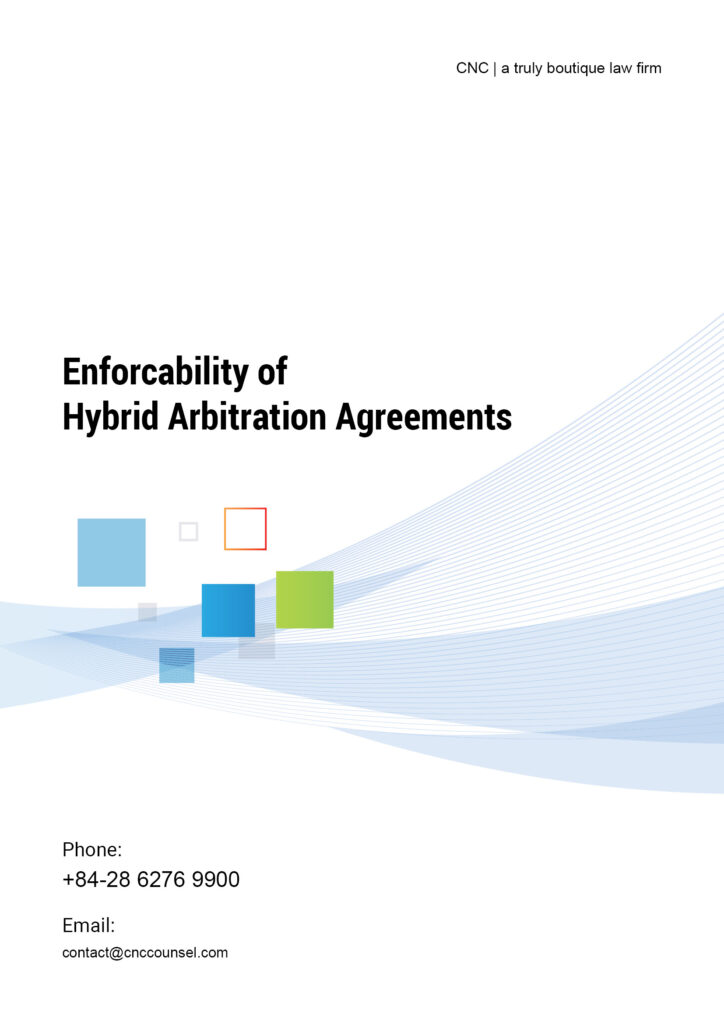Enforcability of Hybrid Arbitration Agreements
Hybrid Arbitration Agreements are established arbitration agreements in which parties agree to select a certain arbitration institution to handle the arbitral proceedings while adopting the rules of another arbitration institution.
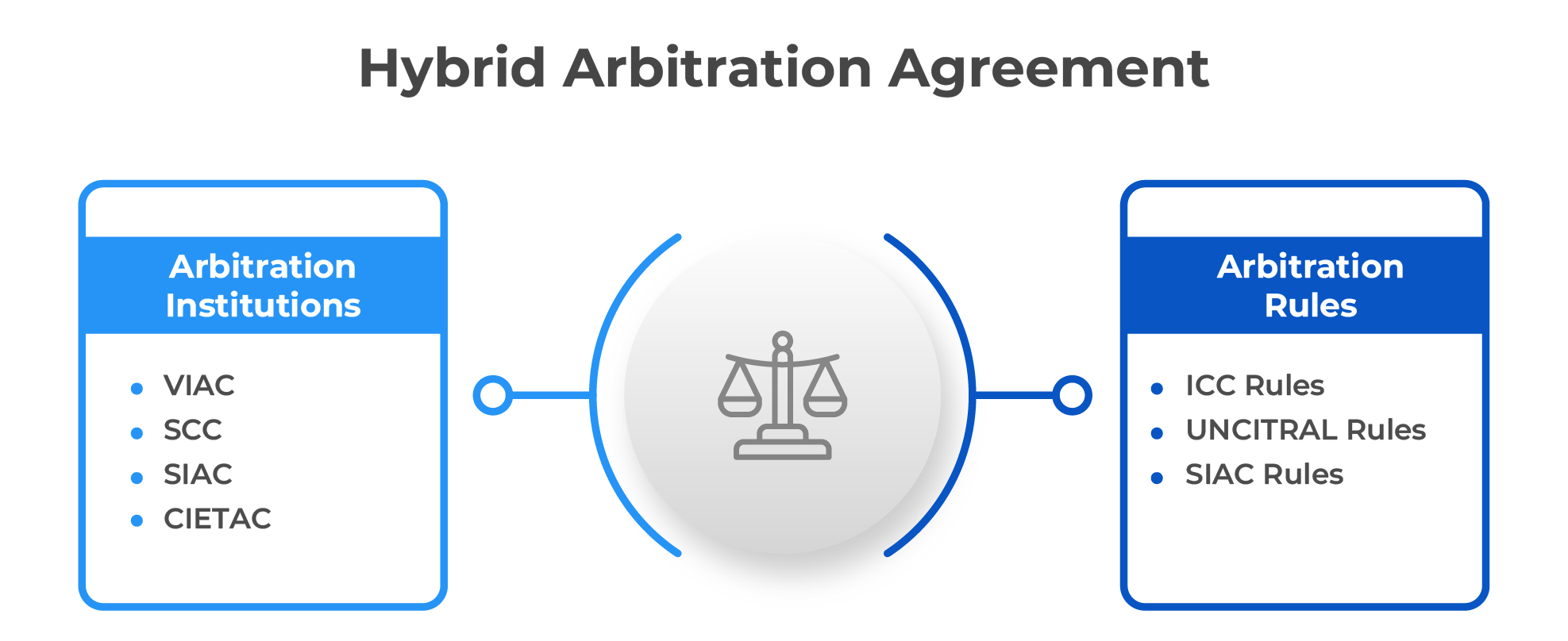
Diversity in hybrid arbitration agreement
As an agreement that combines the two traditional forms of arbitration, namely ad hoc arbitration and institutional arbitration, hybrid arbitration agreements are established based on the principles of party autonomy with the goal of optimizing the merits of traditional forms of arbitration.
However, within the context of the arbitration agreement laws of Vietnam, the enforceability of such hybrid arbitration agreements remains rather ambiguous.
Download PDF file here
Hybrid arbitration agreements are valid arbitration agreements
First of all, it should be noted that although the Law on Commercial Arbitration 2010 does not have clear provisions on hybrid arbitration agreements or enforceability thereof, hybrid arbitration agreements do not fall within cases of invalid arbitration agreements in accordance with Article 18, Law on Commercial Arbitration 2010.
For a hybrid arbitration agreement to be binding on the parties, the following conditions shall be met:
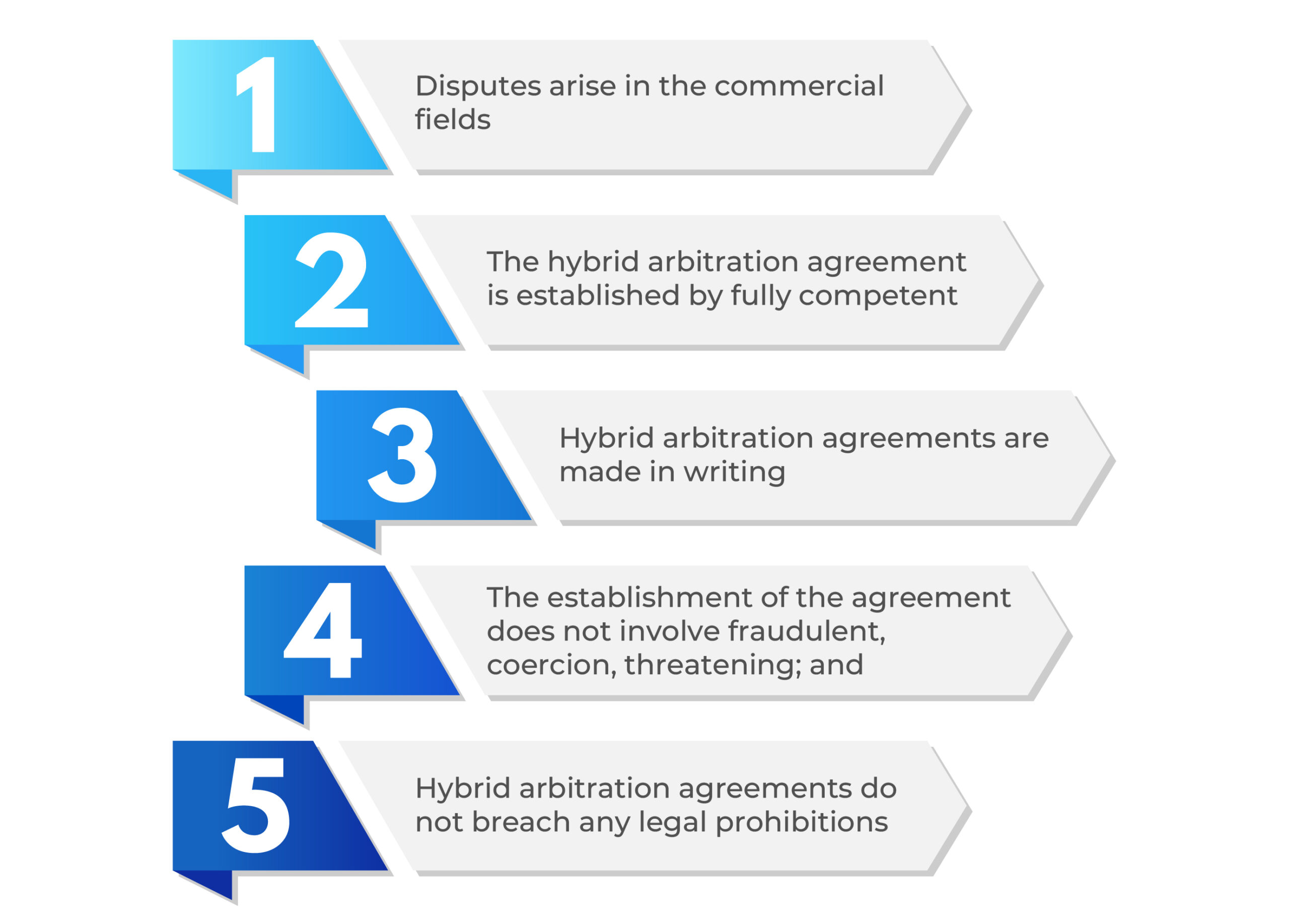
Conditions for hybrid arbitration agreement to take effect
Factually speaking, the parties’ wish to have one arbitration institution handle the arbitral proceeding while adopting the arbitration rules of another arbitration institution is not a legitimate ground that renders hybrid arbitration agreements invalid. Despite the established facts, in practice, opinions on hybrid arbitration agreements in Vietnam remain mixed.
Unenforceable or unclear arbitration agreements?
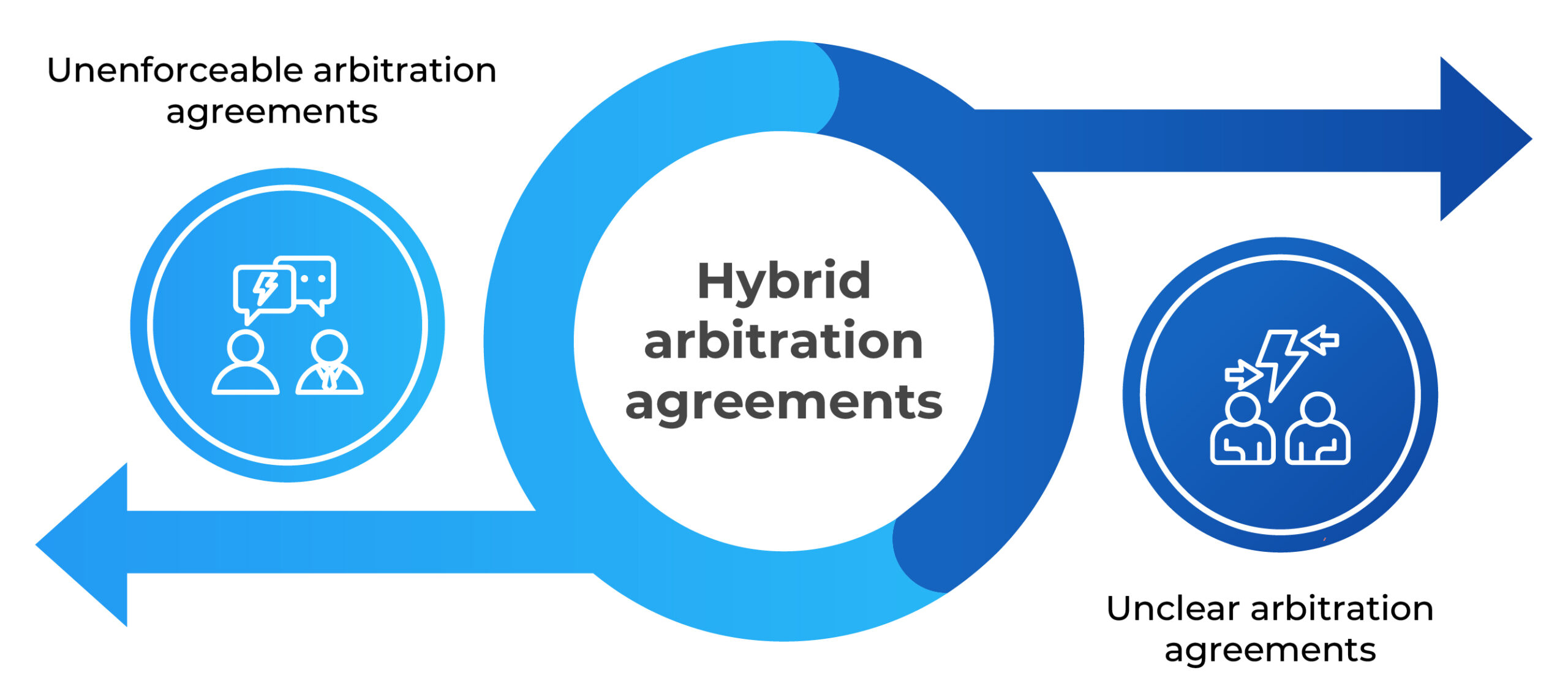
Opinions on hybrid arbitration agreements
Through years of operation in the relevant field, it could be observed that many support the argument that hybrid arbitration agreements are unenforceable in accordance with clause 4, Article 4, Resolution No. 01/2014/NQ-HDTP. However, this argument is rather inconsistent with the provisions of Resolution No. 01/2014/HDTP.
According to clause 4, Article 4, Resolution No. 01/2014/NQ-HDTP, an arbitration agreement would be unenforceable if it has all three of the following:
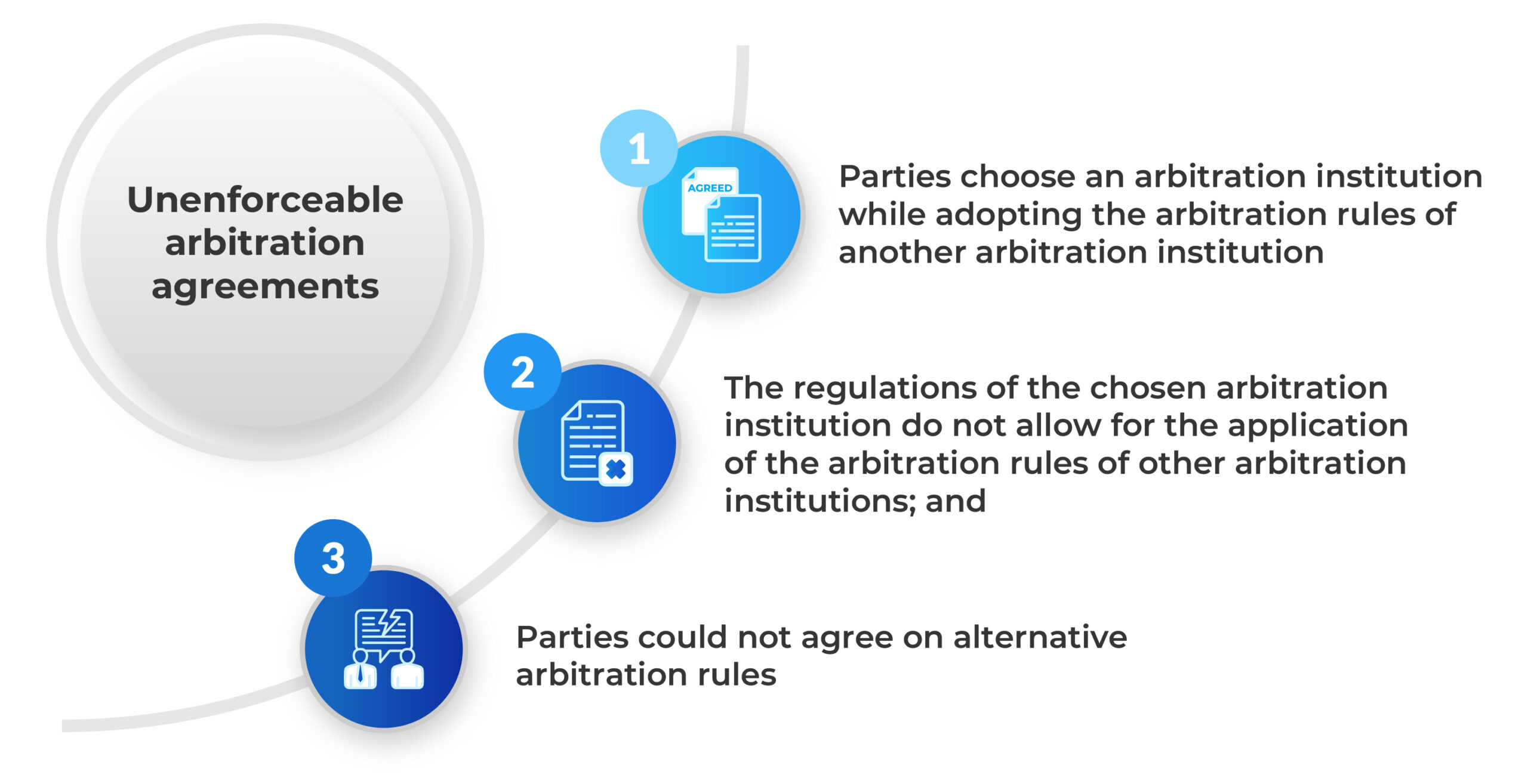
Unenforceable arbitration agreements
In other words, the agreement to apply arbitration rules other than the arbitration rules of the chosen arbitration institution does not automatically render hybrid arbitration agreements unenforceable. Instead, the regulations of the chosen arbitration institution are the decisive factor.
If the regulations of the chosen institution allow the application of the arbitration rules of another arbitration institution, the arbitral tribunal would be managed and operated by the chosen arbitration institution under the rules agreed by the parties. Conversely, if the regulations of the chosen arbitration institution do not allow the application of other arbitration rules, the hybrid arbitration agreement would be considered unenforceable if the parties could not agree on alternative arbitration rules.
Additionally, it should be noted that clause 4, Article, Resolution No. 01/2014/NQ-HDTP uses the terms “regulations” of the arbitration institution instead of “arbitration rules”. As such, it would be inappropriate to automatically conclude that hybrid arbitration agreements are unenforceable without considering the other 2 factors.
On another note, in certain cases, hybrid arbitration agreements are considered unclear arbitration agreements.
Accordingly, hybrid arbitration agreements are considered unclear in relation to the form of arbitration as specified in clause 5, Article 43, Law on Commercial Arbitration 2010. In such situations, parties shall re-negotiate the forms of arbitration for dispute resolution, or failing such negotiation, the claimant shall be entitled to unilaterally decide the form of arbitration.
See more on unclear arbitration agreement at: https://cnccounsel.com/latest-news/unclear-arbitration-agreement
In summary, hybrid arbitration agreements are legally binding arbitration agreements, however, their enforceability is mostly dependent on the circumstances of the case, the perspectives of the courts and arbitration institutions, as well as the agreement between the parties.
First instance of hybrid arbitration agreement being accepted by VIAC
In 2015, for the first time, the Vietnam International Arbitration Center (VIAC) publicly announced a successful administration of hybrid arbitration agreements under the facilitation of the People’s Court of Ho Chi Minh City. Specifically, VIAC has accepted a dispute regarding construction design between two parties, in which the arbitration agreement is as follows:
“…Parties agree that, in the event of disputes or differences in relation to the performance of this Contract, one of the parties might refer the dispute to the Vietnam International Arbitration Center for resolution. Parties shall agree to appoint the sole arbitrator or, failing such agreement, within fourteen (14) days of the failure of one party to respond to the delivery of the request for approval of appointment of the sole arbitrator by the other party, the sole arbitrator shall be appointed by the Court or other competent authorities. Parties agree that, all of the proceedings shall take place in Vietnam and in accordance with the arbitration rules of UNCITRAL…)”[1]
Accordingly, the parties in this dispute have chosen VIAC as the arbitration institution that handles and manages the dispute, however, they also demand that the arbitral proceeding shall be in accordance with the arbitration rules of UNCITRAL[2]
Notably, the above hybrid arbitration agreement did not fall within the scope of institutional arbitration as specified in clause 6, Article 3, Law on Commercial Arbitration 2010, since the parties demand that VIAC shall manage the dispute in accordance with the Arbitration Rules of UNCITRAL. Therefore, VIAC and the People’s Court of Ho Chi Minh determined that this hybrid arbitration agreement falls within the scope of ad hoc arbitration as specified in clause 7, Article 3, Law on Commercial Arbitration 2010. Subsequently, the constitution of the Arbitral Tribunal as well as the management of the dispute shall be based on the Arbitration Rules of UNCITRAL and the support from the People’s Court of Ho Chi Minh City on the registration of arbitral awards.
Hybrid arbitration agreements according to Singapore and China
SIAC accepts managing the arbitration in accordance with the ICC Arbitration Rules
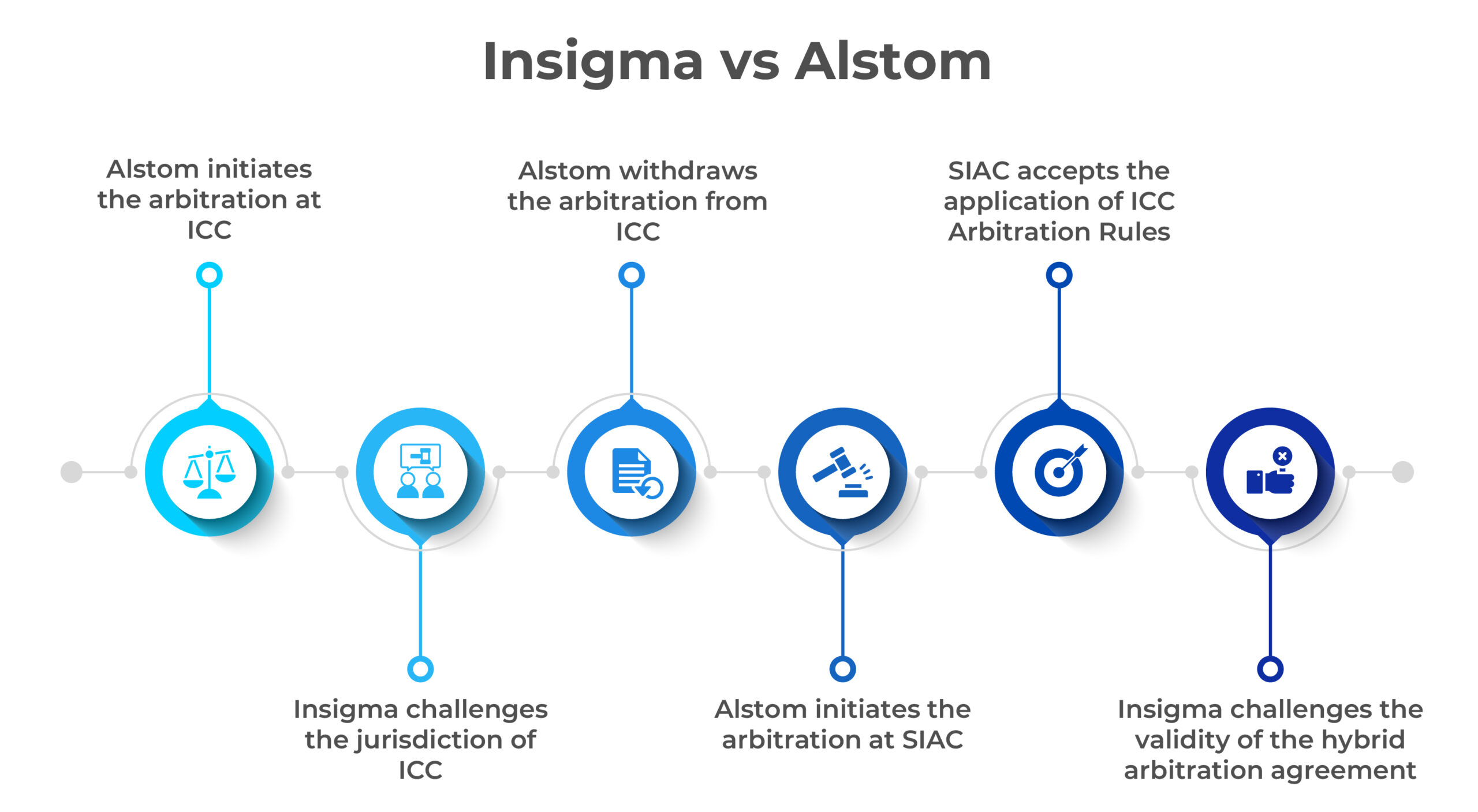
The arbitration between Insigma Technology Co. Ltd and Alstom Technology Ltd.
In 2009, in a dispute between Insigma Technology Co. Ltd and Alstom Technology Ltd.[3], there exists a hybrid arbitration agreement between the parties, which stipulates that disputes shall be resolved at SIAC and in accordance with the ICC Arbitration Rules.
Initially, Alstom initiated arbitration against Insigma at the ICC Arbitration Center under the arbitration rules of this arbitration institution. However, Insigma challenged the jurisdiction of ICC and reasoned that, according to the arbitration agreement between the parties, only SIAC is authorized to handle the arbitral proceedings, and such handling shall be in accordance with the ICC Arbitration Rules. To clarify the arbitration jurisdiction, Alstom, by a letter, requested SIAC to confirm the dispute resolution jurisdiction and, if affirmative, explain how the arbitration shall be handled by SIAC. In the response letter, SIAC replied as follows:
“…We are of the view that there is prima facie jurisdiction for the SIAC to accept the request for arbitration and administer the arbitration under [the Arbitration Agreement]… If the case is submitted to the SIAC, the arbitration will be administered under the SIAC Rules with the ICC Rules to be applied as a guide to the essential features the parties would like to see… For purposes of performing these procedures, the equivalent functions of the “Secretary-General” and “Court” would, under the SIAC system, be the Registrar and the Chairman, respectively. The SIAC is also prepared to remunerate the Tribunal to be appointed in accordance with an ad valorem scale along similar lines to that applied by the ICC…”[4]
Observably, SIAC’s viewpoint is that the arbitration agreement is valid and enforceable. This results in Alstom withdrawing arbitration from ICC and restarting the arbitration at SIAC, the latter has accepted the application of ICC Arbitration Rules. However, subsequent to the issuance of the arbitral award, Insigma appealed under the reasoning that the arbitration agreement is invalid and unenforceable due to uncertainty[5]. However, these appeals were rejected by the Singapore High Court and Court of Appeal.
Afterward, during the recognition and enforcement of the arbitral award by Alstom in China, Insigma once again objected under the reasoning that the Arbitral Tribunal was not constituted in accordance with the parties’ agreement. At that time, the Court of Hangzhou accepted Insigma’s objection and refused the request for enforcement of the arbitral award. Accordingly, the Court of Hangzhou ruled that the arbitrator being appointed by SIAC instead of the ICC Court of Arbitration in accordance with the ICC Rules is a breach of the agreement between the parties[6].
First instance of the validity of hybrid arbitration agreements being accepted in China
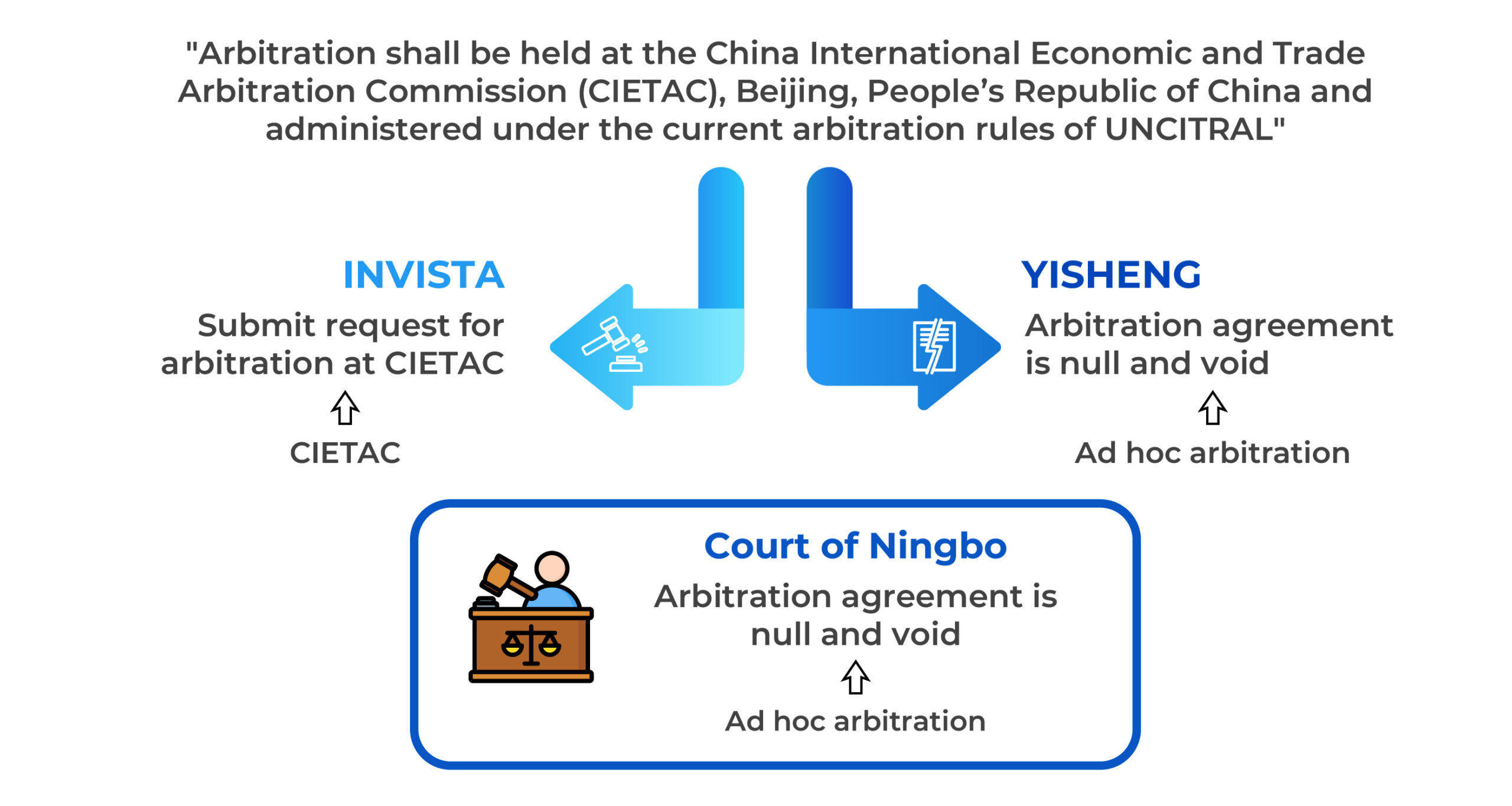
The arbitration between Zhejiang Yisheng Petrochemical Co., Ltd, and INVISTA Technology Co.
In the arbitration between Zhejiang Yisheng Petrochemical Co., Ltd and INVISTA Technology Co., Ltd (Luxembourg), there exists a hybrid arbitration agreement as follows:
“The arbitration shall take place at China International Economic Trade Arbitration Centre (CIETAC), Beijing, P. R. China and shall be settled according to the UNCITRAL Arbitration Rules as at present in force.”
With that as the basis, INVISTA submitted the request for arbitration to CIETAC. Finding the arbitration jurisdiction disagreeable, Yisheng requests the People’s Court of Ningbo to declare the arbitration agreement null and void since the parties agree on an ad hoc arbitration, which is contrary to China’s Law on Arbitration.
According to the principles of advance notice in China[7], under the guidance of the People’s Supreme Court, the Court of Ningbo ruled that the arbitration agreement is valid. Accordingly, the court found that the arbitration agreement between the parties is institutional arbitration and not ad hoc arbitration based on the wording of the arbitration agreement as well as the will of the parties during the drafting[8]. To be specific, although the parties made a spelling error of the full name of CIETAC, they used the expression “take place at”, which is usually followed by either the location of the arbitration or the arbitration agency for purposes of achieving the goal in arbitration. As such, the court ruled that the arbitration institution chosen by the parties is CIETAC and the arbitration agreement remains valid.
With that being the case, it is clear that the Courts of countries other than Vietnam, such as Singapore, China, Sweden[9],… have considered and are still considering the recognition of the validity of hybrid arbitration agreements, thus the principles of party autonomy in commercial arbitration.
Risks and enforceability of hybrid arbitration agreements in practice
Despite having the precedent of VIAC successfully administering arbitration based on a hybrid arbitration agreement, through reconciliation with the current laws of Vietnam, hybrid arbitration agreements could be viewed as high-risk arbitration agreements
Different from the perspective of the Singapore High Court and Court of Appeal that hybrid arbitration agreement is a separate type of agreement that combines institutional arbitration and ad hoc arbitration, the Court of Ho Chi Minh City viewed hybrid arbitration agreements as a form of ad hoc arbitration agreement under the law of Vietnam. This brings about risks of applicable law disputes in the event of conflicts of laws.
Conflict of laws due to hybrid arbitration agreements
Conflict of laws between the UNCITRAL Arbitration Rules or other arbitration rules and the law of the seat of arbitration is also an issue worthy of attention in relation to hybrid arbitration agreements.
Appointment of arbitrators
Regarding the appointment of arbitrators, depending on the chosen form of arbitration, the regulations on this matter may likely vary as follows[10]:
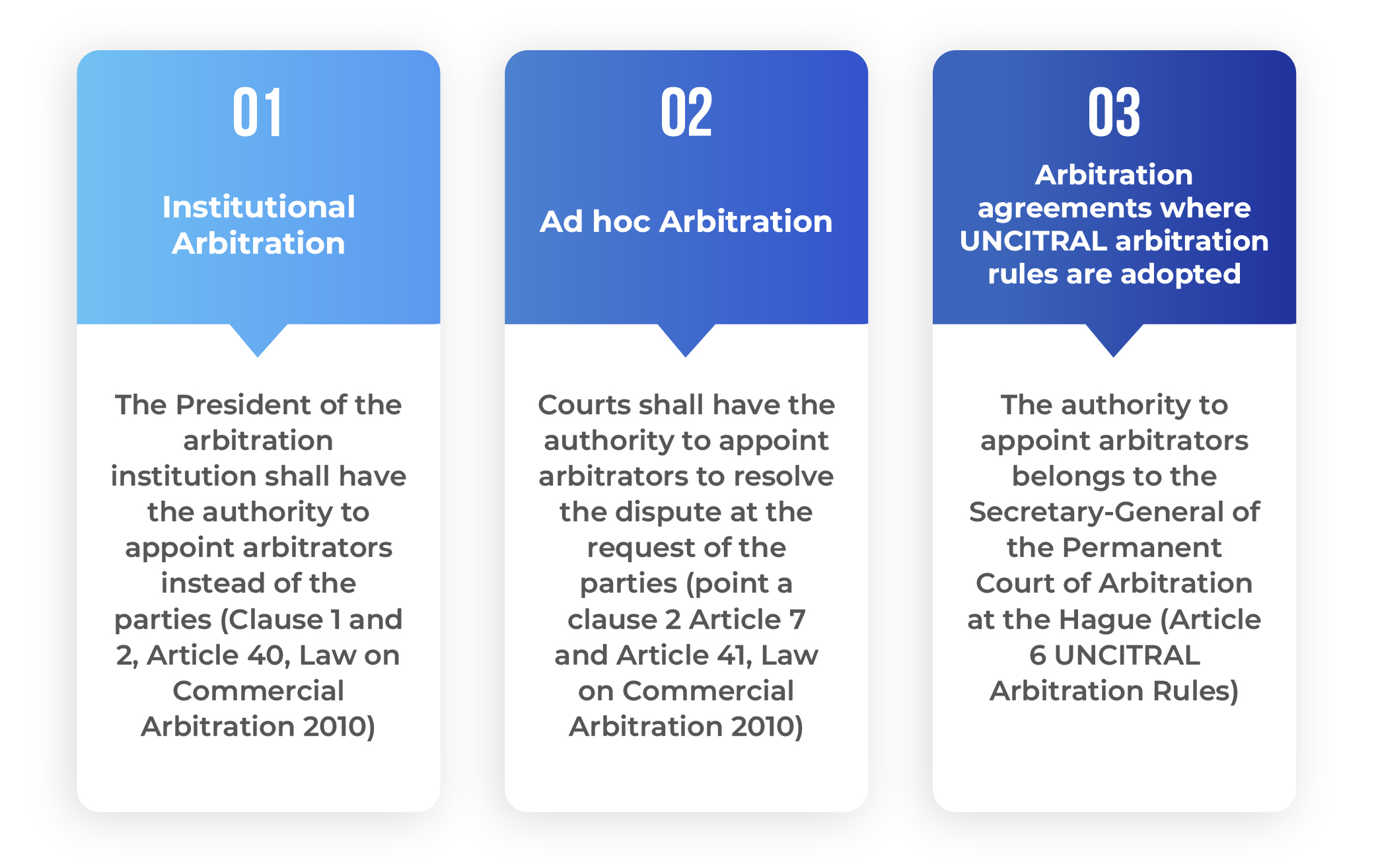
Different regulations regarding the appointment of arbitrators
The above differences in regulation beg the question of which regulations would be applicable. And the answer to this question would be subject to the circumstances of each case, as well as the perspectives of the courts during their review of the dispute
For example, in the dispute regarding construction design services at VIAC mentioned above, parties agree on the appointment of arbitrators as follows: “In cases where no consensus is reached, the arbitrator shall be appointed by the Court or competent authorities”. However, the parties in this particular case hold different views. To be specific, the Claimant believes that the courts have the power to appoint arbitrators in accordance with the 2010 Law on Commercial Arbitration. On the other hand, the Respondent argued that arbitrators should be appointed by the Secretary-General of the Permanent Court of Arbitration at the Hague in accordance with the UNCITRAL Arbitration Rules[11].
In the arbitrator appointment decision, the local provincial court where the Respondent is located (the People’s Court of Ho Chi Minh City) has affirmed its authority to appoint arbitrators based on clause 3, Article 7 and Article 41, 2010 Law on Commercial Arbitration. The Court also claimed that, even in the absence of explicit agreements, Article 41 of the Law on Commercial Arbitration takes priority over Article 6 of the UNCITRAL Arbitration Rules, which means that the court shall remain as the competent authority for the appointment of arbitrators.[12]
Therefore, it is evident that the court has confirmed that the authority to appoint arbitrators originates from the nature of the arbitration agreement being ad hoc arbitration. Accordingly, VIAC does not serve as an arbitration institution, instead, it “only assumes the roles of a provider of administrative services and support for the ad hoc Arbitral Tribunal in its dispute resolution so that it would be efficient and successful”[13]. However, it should be noted that this is solely the perspective of the court in one particular case and such a perspective may not be applicable to all other cases (where VIAC and UNCITRAL Arbitration Rules are combined). For instance, in a dispute in China, the Court of Ningbo determined that the hybrid arbitration agreement is a form of institutional arbitration.
Waiver of challenge rights
The laws of Vietnam and the Arbitration Rules also have different provisions regarding waiver of the challenge rights, to be specific:
Based on Article 13, 2010 Law on Commercial Arbitration, which was elaborated in Article 6, Resolution No. 01/2014/NQ-HDTP, the time for challenge rights to be exercised shall be: (i) in accordance with the provisions of the Law on Commercial Arbitration 2010; (ii) in accordance with the agreement between parties or the arbitration rules; or (iii) prior to the issuance of the arbitral award by the Arbitral Tribunal.
On the other hand, Article 32, UNCITRAL Arbitration Rules requires that objections to non-compliance with the Rules or any requirement of the arbitration agreement shall be made promptly. Otherwise, the party shall be deemed to have waived its challenge right. However, UNCITRAL does not clarify what it means to be “promptly”
In a dispute at VIAC, the court cited Article 13, Law on Commercial Arbitration and concluded that the respondent had waived their challenge rights. According to the views of two other scholars, despite the UNCITRAL Arbitration Rules not being mentioned by the Court, the analogous application based on these rules would also lead to the same result[14].
Recommendation
Parties should exercise extra caution during their establishment of arbitration agreements. In Vietnam, hybrid arbitration agreements between the parties may not be enforced as “smoothly” or similar to how the aforementioned 2015 dispute at VIAC[15] was resolved. Instead, the enforcement of this clause mainly depends on the perspectives of the court and the arbitration institution, as well as the Arbitral Tribunal.
As mentioned in the previous section, according to Resolution No. 01/2014/NQ-HDTP, hybrid arbitration agreements may be deemed as unenforceable if the regulations of the chosen arbitration institution do not allow for such agreements. However, regulations of arbitration institutions may not be as easily accessible. As such, for parties to grasp the regulations relative to this matter, one of the possible solutions is to directly consult with the concerned arbitration institution, thereby clarifying the feasibility as well as the conditions for the enforcement of hybrid arbitration agreements.
This is also the solution employed by Alstom in the case of Insigma Technology Co. Ltd. and Alstom Technology Ltd.; accordingly, Alstom sent a letter directly to SIAC asking about the arbitration jurisdiction. This not only assured Alstom of SIAC’s dispute resolution authority but also SIAC’s arbitral proceedings. Furthermore, SIAC’s response letter is also an important basis for the arbitral award to maintain its effectiveness before the appeal against SIAC’s jurisdiction by Insigma.
It should also be noted that SIAC’s acceptance to administrate the arbitration in accordance with the ICC Arbitration Rules does not mean that other arbitration institutions would accept the same.
Up to now, VIAC has also received multiple cases where arbitration agreements choose VIAC and adopt the ICC, however, these arbitration agreements are deemed unenforceable. In many cases, parties must re-negotiate the forms of dispute resolution so that the VIAC Arbitration Rules are applicable. While there could be multiple reasons, however, the primary reason is that the ICC Arbitration rules themselves do not allow other arbitration institutions to apply ICC arbitration rules in their administration of arbitration. To be specific:
“The International Court of Arbitration (Court) does not itself resolve disputes. It administers the resolution of disputes by arbitral tribunals, in accordance with the Rules of Arbitration of ICC (the “Rules”). The Court is the only body authorized to administer arbitrations under the Rules, including the scrutiny and approval of awards rendered in accordance with the Rules. It draws up its own internal rules, which are set forth in Appendix II (the “Internal Rules”).”[16]
In summary, the enforceability of hybrid arbitration agreements not only depend on the perspectives of the court, the arbitration institution, and the arbitral tribunal but also the provisions of the selected arbitration rules. During the drafting of the arbitration agreement, parties should make careful considerations, research and discuss thoroughly at the initial stages in order to mitigate the risks of dispute relative to the arbitration agreement, which could cause the dispute resolution process to be prolongated.
Managed by
 |
Kieu Nu My Hao | Associate
Phone: (84) 28 6276 9900 Email: hao.kieu@cnccounsel.com |
 |
Nguyen Le Anh Thu | Legal Assistant
Phone: (84) 932 705 676 Email: thu.nguyen@cnccounsel.com |
Contact Us
For further information, please contact:
CNC Vietnam Law Firm
Address: The Sun Avenue, 28 Mai Chi Tho, Binh Trung Ward, Ho Chi Minh City, Vietnam
Phone: 028 6276 9900
Hotline: 0916 545 618
Email: contact@cnccounsel.com
Website: cnccounsel
We would be delighted to welcome you at CNC’s office, where you’ll have the opportunity to consult with the lawyer best suited to your circumstances. Of course, if you are unable to meet in person, simply email us via contact@cnccounsel.com or call us via (+84-28) 6276 9900.
Disclaimers:
This article has been prepared and published for the purpose of introducing or informing our Clients and potential clients on information pertaining to legal issues, opinions and/or developments in Vietnam. Information presented in this article does not constitute legal advice of any form and may be adjusted without advance notice.
————————————————–
[1] Chau Viet Bac, “Vận hành thủ tục trọng tài theo điều khoản trọng tài lai tại VIAC”, [https://www.viac.vn/thu-tuc-trong-tai/van-hanh-thu-tuc-trong-tai-theo-dieu-khoan-trong-tai-lai-tai-viac-a46.html], accessed on 10/2/2025.
[2] Model Law on International Commercial Arbitration by the United Nations Commission on International Trade Law
[3] Judgment No. CA155/2008 dated 02/06/09 between Insigma Technology Co Ltd and Alstom Technology Ltd, [https://www.elitigation.sg/gd/s/2009_SGCA_24], accessed on 12/02/2025
[4] Paragraph 9 of Judgment No. CA155/2008 dated 02/06/09 between Insigma Technology Co Ltd and Alstom Technology Ltd, [https://www.elitigation.sg/gd/s/2009_SGCA_24], accessed on 12/02/2025
[5] Richard Hill, Hybrid ICC/SIAC arbitration clause upheld in Singapore, Kluwer Arbitration Blog, [https://arbitrationblog.kluwerarbitration.com/2009/06/10/hybrid-iccsiac-arbitration-clause-upheld-in-singapore/], accessed on 12/02/2025.
[6] Willems, Jane, ‘The Arbitrator’s Jurisdiction at Risk: The Case of Hybrid and Asymmetrical Arbitration Agreements’ 2017 Kluwer Law International BV, The Netherlands, Chapter 38; Party autonomy is stipulated in some provisions, such as Article 4.1 and Article 6 of the Law on Commercial Arbitration 2010
[7] When lower courts find a Foreign-related arbitration agreement is unenforceable, they must first report their findings to higher courts, upon the higher courts’ affirmation of the findings, the People’s Supreme Court shall issue a decision. See more at “Notice of the Supreme People’s Court on the Handling by People’s Courts of Issues Concerning Foreign-related Arbitration and Foreign Arbitration”, [https://cicc.court.gov.cn/html/1/219/199/204/812.html] accessed on 13/02/2025.
[8] Model Cases Regarding Providing Judicial Services and Safeguards by the People’s Courts for the Construction of the “Belt and Road””, Case No. 6, [https://cicc.court.gov.cn/html/1/219/199/204/812.html], accessed on 13/02/2025.
[9] In the case between Government of the Russian Federation v. I.M. Badprim S.R.L., the Court interpreted that the main purpose of the agreement was that the parties settled their disputes by arbitration, in Stockholm, at theSCC. The Court noted that the SCC agreed to, and also did administer the arbitration, which indicated that the agreement was enforceable, finding the clause to be valid.. See more at [https://www.arbitration.sccinstitute.com/Swedish-Arbitration-Portal/Court-of-Appeal/Court-of-Appeal/Court-of-Appeal/d_2281406-judgment-of-the-svea-court-of-appeal-23-january-2015-case-no.-t-2454-14], accessed on 12/02/2025.
[10] Cited (7)
[11] Cited (1)
[12] Chau Viet Bac, “Vietnamese centre hosts first case under UNCITRAL rules, [https://www.viac.vn/en/arbitration/vietnamese-centre-hosts-first-case-under-uncitral-rules-a63.html], accessed on 7/2/2025.
[13] Cited (1)
[14] Cited (10)
[15] In a certain dispute, the parties could not agree on the arbitrator and the Court had to issue a decision appointing the an independent arbitrator. In this dispute, the arbitrator issued an arbitral award requesting the respondent to indemnify an amount of 742 million Vietnamese dong (approximately 33.125 US dollar) and payment of the 59 million Vietnamese dong (approximately 2.630 US dollar). The Respondent requested the courts to set aside the arbitral award based on Article 68 of the Law on Commercial Arbitration. However, the competent court dismissed this request and maintain the arbitral award. Afterwards, the Claimant has successfully concluded an arbitration agreement in accordance with the law, which might serve as a basis for enforcement authority to, in the absence of the Respondent’s voluntariness, force the Respondent to implement the award.
[16] Article 1 ICC Arbitration Rules


